牛津深圳版英语九年级上Module 3 Leisure time Unit 6 Healthy diet宾语从句课件(17张PPT无素材)
文档属性
| 名称 | 牛津深圳版英语九年级上Module 3 Leisure time Unit 6 Healthy diet宾语从句课件(17张PPT无素材) |  | |
| 格式 | zip | ||
| 文件大小 | 985.2KB | ||
| 资源类型 | 教案 | ||
| 版本资源 | 牛津深圳版 | ||
| 科目 | 英语 | ||
| 更新时间 | 2020-10-24 21:01:03 | ||
图片预览

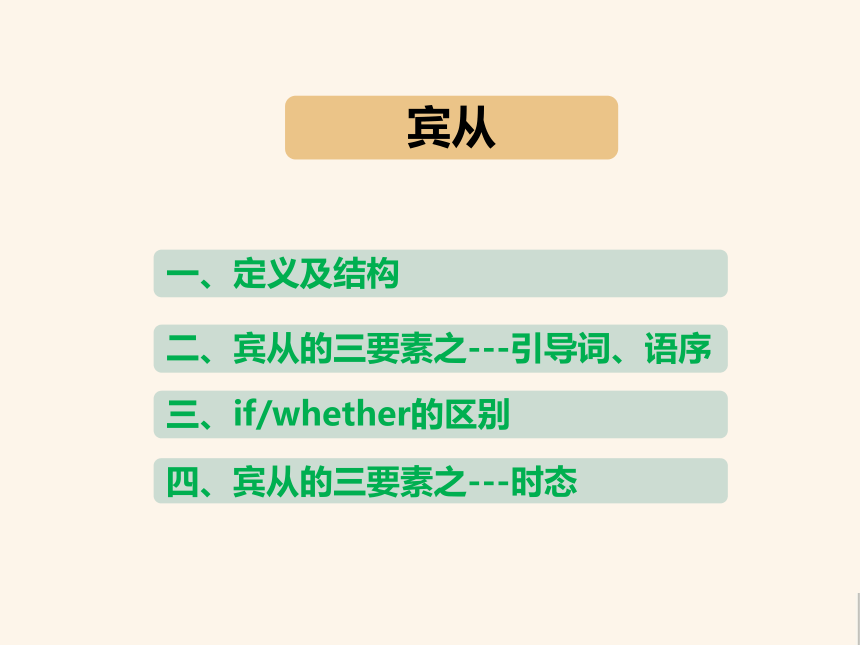
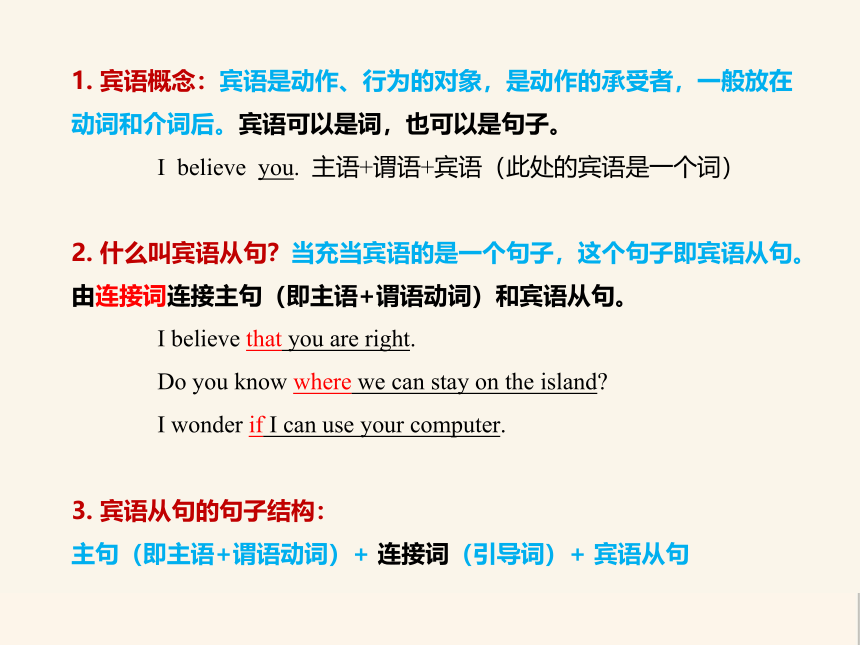
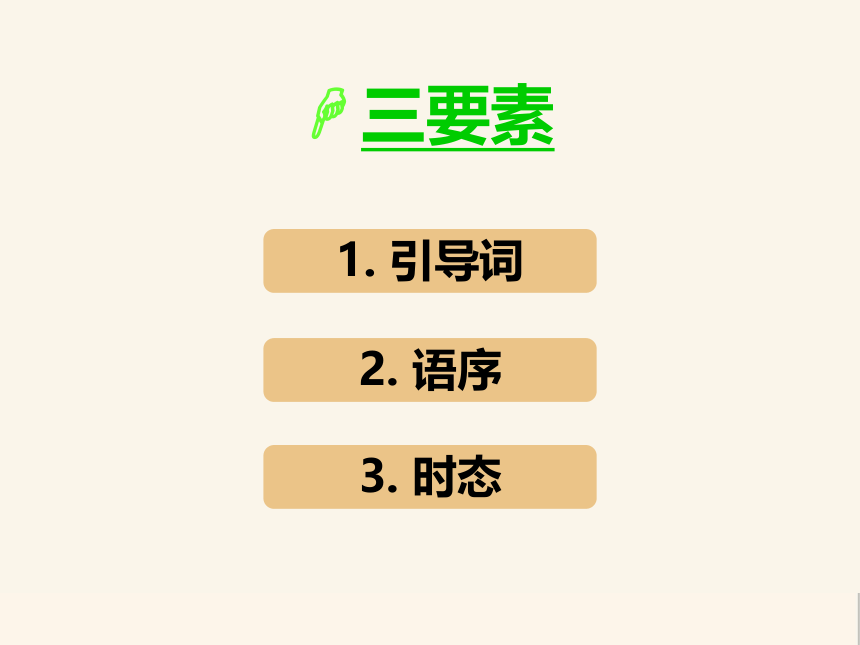
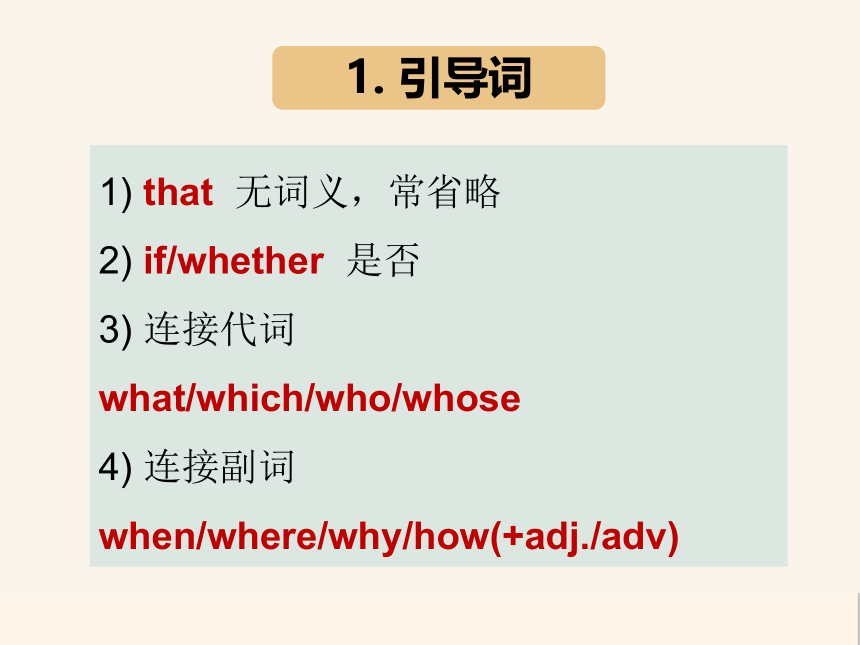
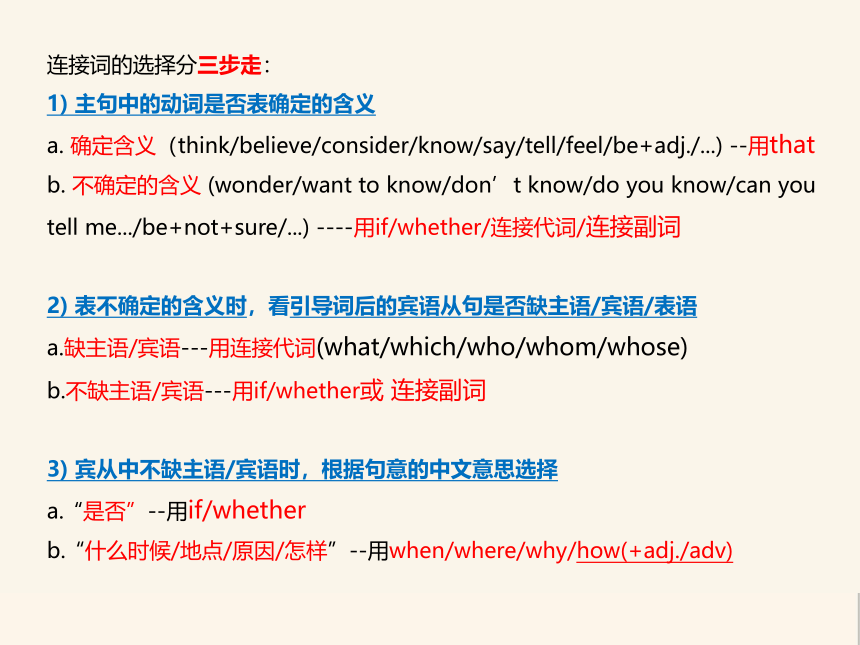
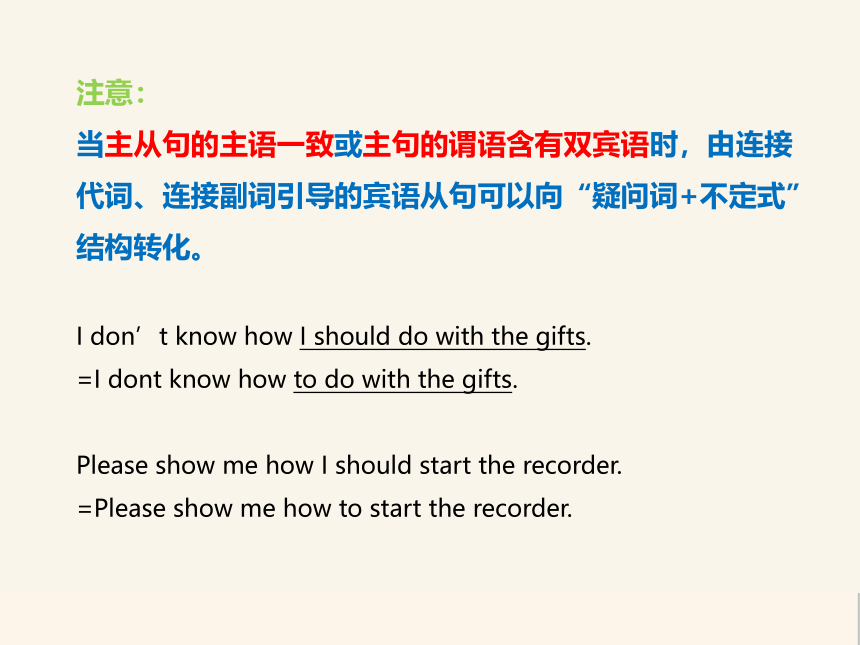
文档简介
(共17张PPT)
Grammar
宾语从句
一、定义及结构
二、宾从的三要素之---引导词、语序
三、if/whether的区别
四、宾从的三要素之---时态
宾从
1.
宾语概念:宾语是动作、行为的对象,是动作的承受者,一般放在动词和介词后。宾语可以是词,也可以是句子。
I
believe
you.
主语+谓语+宾语(此处的宾语是一个词)
2.
什么叫宾语从句?当充当宾语的是一个句子,这个句子即宾语从句。由连接词连接主句(即主语+谓语动词)和宾语从句。
I
believe
that
you
are
right.
Do
you
know
where
we
can
stay
on
the
island?
I
wonder
if
I
can
use
your
computer.
3.
宾语从句的句子结构:
主句(即主语+谓语动词)+
连接词(引导词)+
宾语从句
?
三要素
1.
引导词
2.
语序
3.
时态
1.
引导词
1)
that
无词义,常省略
2)
if/whether
是否
3)
连接代词
what/which/who/whose
4)
连接副词when/where/why/how(+adj./adv)
连接词的选择分三步走:
1)
主句中的动词是否表确定的含义
a.
确定含义(think/believe/consider/know/say/tell/feel/be+adj./...)
--用that
b.
不确定的含义
(wonder/want
to
know/don’t
know/do
you
know/can
you
tell
me.../be+not+sure/...)
----用if/whether/连接代词/连接副词
2)
表不确定的含义时,看引导词后的宾语从句是否缺主语/宾语/表语
a.缺主语/宾语---用连接代词(what/which/who/whom/whose)
b.不缺主语/宾语---用if/whether或
连接副词
3)
宾从中不缺主语/宾语时,根据句意的中文意思选择
a.“是否”--用if/whether
b.“什么时候/地点/原因/怎样”--用when/where/why/how(+adj./adv)
注意:
当主从句的主语一致或主句的谓语含有双宾语时,由连接代词、连接副词引导的宾语从句可以向“疑问词+不定式”结构转化。
I
don’t
know
how
I
should
do
with
the
gifts.
=I
dont
know
how
to
do
with
the
gifts.
Please
show
me
how
I
should
start
the
recorder.
=Please
show
me
how
to
start
the
recorder.
2.
语序
宾语从句中用陈述句语序,即连接词后是主语+谓语动词。
注意:疑问词做连接词时,有时候亦可充当从句主语。
当从句为以下句子以及what,
who作主语时,语序不变。
what’s
the
matter?/what’s
wrong?/what’s
up?/
what
happened?/what
is
happening?/
which
is
the
way
to….
例:I
don't
know
what’s
the
matter.
Can
you
tell
me
who
is
over
there?
?
if/whether的区别
1.
只能用whether不能用if的情况
2.
只能用if不能用whether的情况
注意:whether和if
通常可以互换,表示“是否”,但是在以下四种情况中,连接词只能用whether。
1)
与or
或or
not连用时
I
don’t
know
whether
he
will
come
or
not.
2)
放在句首时
Whether
he
will
come
is
still
a
question.
3)
放介词后
It
depends
on
whether
he
is
happy.
4)
与不定式连用时
I
don’t
know
whether
to
go.
只能用whether的情况
以下情况中,连接词只能用if。
1)
引导条件状语从句,if意为“如果”时
We’ll
go
hiking
if
it
doesn’t
rain
tomorrow.
2)宾语从句如果是否定句,一般用if
I
don’t
care
if
she
doesn’t
come.
只能用if的情况
3.
时态
主句时态
从句时态
一般现在时、一般将来时、祈使句
根据句意需要用相应时态
一般过去时
与原句相对应的过去的时态
客观事实、真理、自然现象、名言警句、谚语等
一律用一般现在时
1)
宾语从句中如果主句是现在的时态(包括一般现在时,现在进行时,现在完成时),从句的时态可根据实际情况而定,主要看时间状语和语境。
I
know
(that)
he
lives
here
all
the
time.
I
know
(that)
he
lived
here
ten
years
ago.
I
have
heard
(that)
he
will
come
next
week.
2)
宾语从句中如果主句是过去的时态(包括一般过去时,过去进行时...),那么从句的时态一定用相应的过去时(包括一般过去时,过去进行时,过去将来时,过去完成时)。
I
knew
(that)
he
lived
here.
He
asked
us
if
everybody
was
here.
He
said
that
he
had
seen
it.
注意:
1.
当主句是一般过去时,而从句表示的是客观真理,自然现象,科学原理,格言等,从句仍然要用一般现在时。
He
said
that
the
earth
moves
round
the
sun.
The
teacher
told
us
that
light
travels
faster
than
sound.
2.
could等情态动词过去式在一般疑问句中提问,表委婉语气,不表示过去时。
3.
从句中的否定转移
主句谓语动词是think,
believe,
expect,
guess等,表示“认为,相信,期望,猜想“等意思,主句的主语是第一人称,且时态为一般现在时时,从句的否定一般要转移到主句上。其反意疑问句一般与宾语从句一致。
I
don’t
believe
she
will
take
part
in
the
party.
我相信她不会参加聚会。
I
don’t
think
it’s
your
fault.
我认为这不是你的错。
改为反意疑问句
I
don’t
think
it’s
your
fault,
is
it?
Thank
you
Grammar
宾语从句
一、定义及结构
二、宾从的三要素之---引导词、语序
三、if/whether的区别
四、宾从的三要素之---时态
宾从
1.
宾语概念:宾语是动作、行为的对象,是动作的承受者,一般放在动词和介词后。宾语可以是词,也可以是句子。
I
believe
you.
主语+谓语+宾语(此处的宾语是一个词)
2.
什么叫宾语从句?当充当宾语的是一个句子,这个句子即宾语从句。由连接词连接主句(即主语+谓语动词)和宾语从句。
I
believe
that
you
are
right.
Do
you
know
where
we
can
stay
on
the
island?
I
wonder
if
I
can
use
your
computer.
3.
宾语从句的句子结构:
主句(即主语+谓语动词)+
连接词(引导词)+
宾语从句
?
三要素
1.
引导词
2.
语序
3.
时态
1.
引导词
1)
that
无词义,常省略
2)
if/whether
是否
3)
连接代词
what/which/who/whose
4)
连接副词when/where/why/how(+adj./adv)
连接词的选择分三步走:
1)
主句中的动词是否表确定的含义
a.
确定含义(think/believe/consider/know/say/tell/feel/be+adj./...)
--用that
b.
不确定的含义
(wonder/want
to
know/don’t
know/do
you
know/can
you
tell
me.../be+not+sure/...)
----用if/whether/连接代词/连接副词
2)
表不确定的含义时,看引导词后的宾语从句是否缺主语/宾语/表语
a.缺主语/宾语---用连接代词(what/which/who/whom/whose)
b.不缺主语/宾语---用if/whether或
连接副词
3)
宾从中不缺主语/宾语时,根据句意的中文意思选择
a.“是否”--用if/whether
b.“什么时候/地点/原因/怎样”--用when/where/why/how(+adj./adv)
注意:
当主从句的主语一致或主句的谓语含有双宾语时,由连接代词、连接副词引导的宾语从句可以向“疑问词+不定式”结构转化。
I
don’t
know
how
I
should
do
with
the
gifts.
=I
dont
know
how
to
do
with
the
gifts.
Please
show
me
how
I
should
start
the
recorder.
=Please
show
me
how
to
start
the
recorder.
2.
语序
宾语从句中用陈述句语序,即连接词后是主语+谓语动词。
注意:疑问词做连接词时,有时候亦可充当从句主语。
当从句为以下句子以及what,
who作主语时,语序不变。
what’s
the
matter?/what’s
wrong?/what’s
up?/
what
happened?/what
is
happening?/
which
is
the
way
to….
例:I
don't
know
what’s
the
matter.
Can
you
tell
me
who
is
over
there?
?
if/whether的区别
1.
只能用whether不能用if的情况
2.
只能用if不能用whether的情况
注意:whether和if
通常可以互换,表示“是否”,但是在以下四种情况中,连接词只能用whether。
1)
与or
或or
not连用时
I
don’t
know
whether
he
will
come
or
not.
2)
放在句首时
Whether
he
will
come
is
still
a
question.
3)
放介词后
It
depends
on
whether
he
is
happy.
4)
与不定式连用时
I
don’t
know
whether
to
go.
只能用whether的情况
以下情况中,连接词只能用if。
1)
引导条件状语从句,if意为“如果”时
We’ll
go
hiking
if
it
doesn’t
rain
tomorrow.
2)宾语从句如果是否定句,一般用if
I
don’t
care
if
she
doesn’t
come.
只能用if的情况
3.
时态
主句时态
从句时态
一般现在时、一般将来时、祈使句
根据句意需要用相应时态
一般过去时
与原句相对应的过去的时态
客观事实、真理、自然现象、名言警句、谚语等
一律用一般现在时
1)
宾语从句中如果主句是现在的时态(包括一般现在时,现在进行时,现在完成时),从句的时态可根据实际情况而定,主要看时间状语和语境。
I
know
(that)
he
lives
here
all
the
time.
I
know
(that)
he
lived
here
ten
years
ago.
I
have
heard
(that)
he
will
come
next
week.
2)
宾语从句中如果主句是过去的时态(包括一般过去时,过去进行时...),那么从句的时态一定用相应的过去时(包括一般过去时,过去进行时,过去将来时,过去完成时)。
I
knew
(that)
he
lived
here.
He
asked
us
if
everybody
was
here.
He
said
that
he
had
seen
it.
注意:
1.
当主句是一般过去时,而从句表示的是客观真理,自然现象,科学原理,格言等,从句仍然要用一般现在时。
He
said
that
the
earth
moves
round
the
sun.
The
teacher
told
us
that
light
travels
faster
than
sound.
2.
could等情态动词过去式在一般疑问句中提问,表委婉语气,不表示过去时。
3.
从句中的否定转移
主句谓语动词是think,
believe,
expect,
guess等,表示“认为,相信,期望,猜想“等意思,主句的主语是第一人称,且时态为一般现在时时,从句的否定一般要转移到主句上。其反意疑问句一般与宾语从句一致。
I
don’t
believe
she
will
take
part
in
the
party.
我相信她不会参加聚会。
I
don’t
think
it’s
your
fault.
我认为这不是你的错。
改为反意疑问句
I
don’t
think
it’s
your
fault,
is
it?
Thank
you
